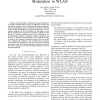Free Online Productivity Tools
i2Speak
i2Symbol
i2OCR
iTex2Img
iWeb2Print
iWeb2Shot
i2Type
iPdf2Split
iPdf2Merge
i2Bopomofo
i2Arabic
i2Style
i2Image
i2PDF
iLatex2Rtf
Sci2ools
VTC
2007
IEEE
2007
IEEE
Channel Prediction Heuristics for Adaptive Modulation in WLAN
— Channel-adaptive techniques increase the efficiency of wireless communications, as they are efficient in coping with the quality variation of the wireless channels. However, channeladaptive mechanisms require a prediction of the future behaviour of the channel. Heuristics are an important alternative to more complex predictors in WLAN scenarios. In this paper we use WLAN measurement traces for the simulative evaluation of the influence of channel prediction errors in the performance of a threshold-based adaptive modulation scheme, considering also the case of delayed channel feedback. The results show that, as long as the necessary prediction horizon does not exceed 2 ms, assuming the channel to stay constant leads to less than 15% capacity loss compared to the case when perfect channel prediction is used. When farther prediction horizons are needed, the moving average of the received signal should be used for channel prediction.
Related Content
| Added | 04 Jun 2010 |
| Updated | 04 Jun 2010 |
| Type | Conference |
| Year | 2007 |
| Where | VTC |
| Authors | Ana Aguiar, Adam Wolisz |
Comments (0)

